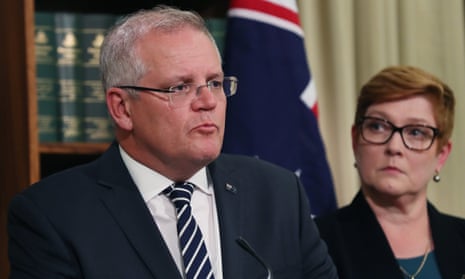Australia’s foreign minister insists a motion that has won support from more than 120 countries will pave the way for an impartial, independent and comprehensive investigation into the handling of the Covid-19 outbreak.
Facing criticism from some hawkish Coalition backbenchers that the motion to go to the World Health Assembly on Monday night had been “watered down”, Marise Payne described the growing global backing for a review as “a win for the international community”.
Australia has been one of the most vocal and early advocates of an independent investigation into the origins and early handling of the coronavirus outbreak, a stance that has attracted strong pushback from China, which claimed it was a political “manoeuvre” against Beijing.
Australian exporters are nervously awaiting a decision, due on Tuesday, on whether China will proceed with a plan to impose steep tariffs on barley, with key Australian ministers reporting they have struggled to secure phone calls with their Chinese counterparts.
But China has been noticeably less critical of the European Union’s attempt to marshal support for its motion to the WHA which, among other things, proposes a review of lessons learned.
The draft motion – now supported by 122 countries, including the members of the European Union and the African Group, the UK, Russia, Canada, Australia and New Zealand – calls for a systemic review of the world’s response to Covid-19.
The latest version of the motion calls on the World Health Organization’s director general to initiate a “stepwise process of impartial, independent and comprehensive evaluation, including using existing mechanisms, as appropriate, to review experience gained and lessons learned from the WHO-coordinated international health response to Covid-19”.
This process should be launched “at the earliest appropriate moment” and in consultation with WHO member states.
Australia is listed as one of the many co-sponsors of the motion, which will go before a virtual session of the WHO’s annual decision-making event being held on Monday and Tuesday.
The NSW Liberal senator Concetta Fierravanti-Wells told 2GB the motion “has been considerably watered down, and just from a cursory reading doesn’t appear to even have a reference to China”.
But Payne welcomed the EU-drafted and Australia-backed motion as “comprehensive” and said it was encouraging to see it had gathered broad international support.
She said it specifically referred to the need for a review to be impartial, independent and comprehensive. “They are three factors which we particularly have sought,” she told reporters in Sydney.
“The prime minister and I have also discussed a number of mechanisms within the WHO, including their independent oversight advisory body, which has the capacity to do some of this work, but that is to be determined after the resolution is dealt with by the World Health Assembly,” she said.
When Payne appeared on the ABC’s Insiders program on 19 April, the minister argued the review could not be conducted by the WHO because “that strikes me as somewhat poacher and gamekeeper”.
Asked on Monday to what extent European diplomats had done the legwork to garner international support, Payne said Australia had been focused on achieving the “most productive outcome” and had worked “with the EU and many others in support of this resolution”.
She dismissed suggestions Australia was currently in a trade war with China, saying Canberra would “deal with issues on their merits as they arise”.
The agriculture minister, David Littleproud, said he had reached out to his Chinese counterpart who had advised they could work through the issues through official-level channels.
The Australian government has kept the door open to taking the issue to the World Trade Organisation if China proceeds with plans to impose tariffs of around 80% on Australian barley imports.
Labor’s health spokesman, Chris Bowen, said he was disappointed to see some Liberal MPs criticising the draft World Health Assembly motion.
He said the opposition still believed it would have been appropriate for the government to secure support from a number of countries before announcing the call for an inquiry. “But the progress in welcoming the motion, the resolution at the World Health Assembly is very much welcome,” he said.
The New Zealand prime minister, Jacinda Ardern, said New Zealand was backing the motion because it was “sensible” to learn the lessons of Covid-19.
“We’re not interested in blame; we’re not interested in any kind of witch-hunt; we’re just interested in learning,” Ardern told Sky News.
